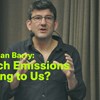neutralize
Axiological Retributivism and the Desert Neutrality Paradox
Campbell, T. Axiological Retributivism and the Desert Neutrality Paradox. Philosophies 2022, 7, 80. https://doi.org/10.3390/philosophies7040080 Abstract: According to axiological retributivism, people canan outcome in which someone gets what she deserves, even if it is bad for her, can thereby haveintrinsic positive value. A question seldom asked is how axiological retributivism should deal withcomparisons of outcomes that differ with respect to the number and identities of deserving agents.Attempting to answer this question exposes a problem for axiological retributivism that parallels awell-known problem in population axiology introduced by John Broome. The problem for axiologicalretributivism is that it supports the existence of a range of negative wellbeing levels such that if adeserving person comes into existence at any of these levels, the resulting outcome is neither betternor worse with respect to desert. However, the existence of such a range is inconsistent with a setof very plausible axiological claims. I call this the desert neutrality paradox. After introducing theparadox, I consider several possible responses to it. I suggest that one reasonable response, thoughperhaps not the only one, is to reject axiological retributivism.
Katie Steele: Neutrality about creating good lives - No panacea for longtermism
Place: At the Institute for Futures Studies, Holländargatan 13, Stockholm, or online.REGISTERAbstractThe principle of neutrality can be seen as a direct response to the totalistapproach to evaluating popu

Katie Steele: Neutrality About Creating Good Lives - No Panacea For Longtermism
The principle of neutrality can be seen as a direct response to the totalist approach to evaluating populations of varying constitution and size: while the latter holds that the addition of a good lif
New Arguments for a pure lottery in Research Funding: A Sketch for a Future Science Policy Without Time-Consuming Grant Competitions
Minerva, vol. 62 Abstract A critical debate has blossomed within the field of research policy, science and technology studies, and philosophy of science regarding the possible benefits and limitations opure lottery
How Valuable are Chances?
Philosophy of Science, Vol. 82, No. 4, p. 602-625. DOI: 10.1086/682915 Abstract Chance Neutrality is the thesis that, conditional on some proposition being true (or being false), its chance of being true
Studies on climate ethics and future generations vol. 5
Working papers 2023-1-11 Tim Campbell & Olle Torpman (eds.) 1. How to Feel About Climate Change? An Analysis of the Normativity of Climate Emotions Julia Mosquera & Kirsti Jylhä 2. How to Value a
Christian Barry: Which emissions belong to us?
Place:Holländargatan 13, Stockholm, or online.REGISTERAbstractTo address climate change we need to reduce net emissions globally. Most international processes and frameworks have involved seeking to g

Which emissions belong to us?
To address climate change we need to reduce net emissions globally. Most international processes and frameworks have involved seeking to get countries to make cuts to their emissions. Net zero has rec
Well-being and population ethics
Workshop on well-being and population ethics. Part of the project ‘Valuing future lives’ (‘Att värdera framtida liv’), funded by the Swedish Research Council (‘Vetenskapsrådet’). Venue: The Institute f
Larry S. Temkin: Assessing the Goodness of Outcomes: Questioning Some Common Assumptions
Larry S. Temkin is Distinguished Professor at Department of Philosophy, Rutgers University.ABSTRACTThis talk explores and challenges several common assumptions regarding the assessment of outcome good








